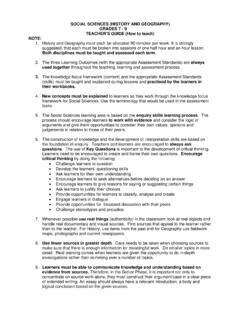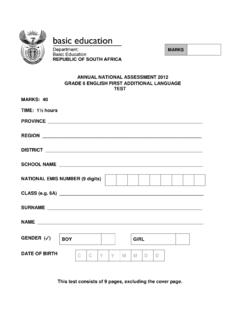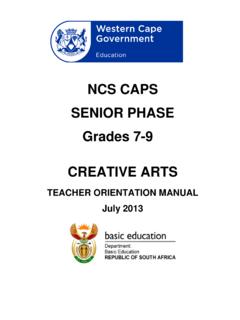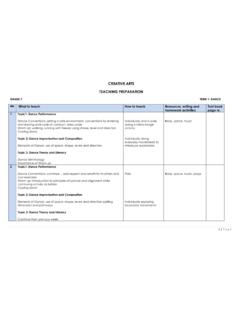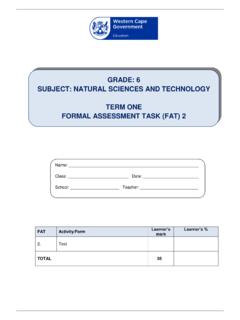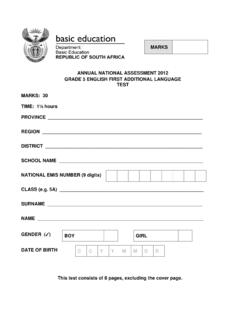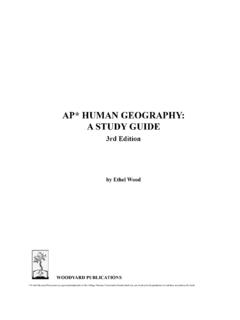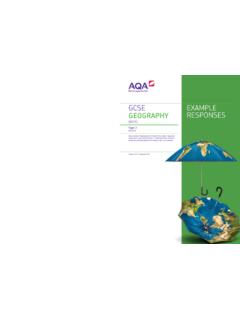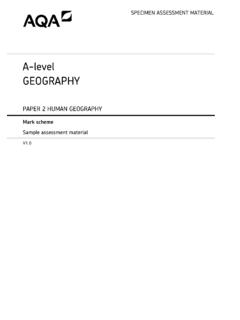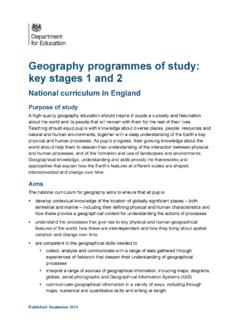Transcription of SOCIAL SCIENCES (HISTORY AND GEOGRAPHY) TEACHER’S …
1 SOCIAL SCIENCES (HISTORY AND geography ) GRADES 7 - 9 TEACHER S GUIDE (How to teach) NOTE: 1. History and geography must each be allocated 90 minutes per week. It is strongly suggested, that each must be broken into sessions of one half hour and an hour lesson. Both disciplines must be taught and assessed each term. 2. The three Learning Outcomes (with the appropriate Assessment Standards) are always used together throughout the teaching, learning and assessment process. 3. The knowledge focus framework (content) and the appropriate Assessment Standards (skills) must be taught and explained during lessons and practised by the learners in their workbooks.
2 4. New concepts must be explained to learners as they work through the knowledge focus framework for SOCIAL SCIENCES . Use the terminology that would be used in the assessment tasks. 5. The SOCIAL SCIENCES learning area is based on the enquiry skills learning process. The process should encourage learners to work with evidence and consider the logic of arguments and give them opportunities to consider their own values, opinions and judgements in relation to those of their peers. 6. The construction of knowledge and the development of interpretation skills are based on the foundation of enquiry. Teachers and learners are encouraged to always ask questions.
3 The use of Key Questions is important to the development of critical thinking. Learners need to be encouraged to create and frame their own questions. Encourage critical thinking by doing the following: Challenge learners to question Develop the learners questioning skills Ask learners for their own understanding Encourage learners to seek alternatives before deciding on an answer Encourage learners to give reasons for saying or suggesting certain things Ask learners to justify their choices Provide opportunities for learners to classify, analyse and create Engage learners in dialogue Provide opportunities for focussed discussion with their peers Challenge stereotypes and prejudice 7.
4 Whenever possible use real things (authenticity) in the classroom: look at real objects and handle real documentary and visual sources. Find sources that appeal to the learner rather than to the teacher. For History, use items from the past and for geography use fieldwork maps, photographs and current newspapers. 8. Use fewer sources in greater depth. Care needs to be taken when choosing sources to make sure that there is enough information for meaningful work. Do smaller topics in more detail. Real learning comes when learners are given the opportunity to do in-depth investigations rather than skimming over a number of topics.
5 9. Learners must be able to communicate knowledge and understanding based on evidence from sources. Therefore, in the Senior Phase, it is important not only to concentrate on source work alone, they must construct their argument/case in a clear piece of extended writing. An essay should always have a relevant introduction, a body and logical conclusion based on the given sources. The following bullets should be added after the Assessment Programme All assessment tasks must be developed within the context of the learners. All the learning outcomes (with the appropriate assessment standards) and the content (knowledge focus framework) are assessed together.
6 Instructions must be clear to the learners. All the formal assessment tasks have the same weight. Evidence of all the content, exercises and activities (informal assessment) must be evident in learner workbooks, before the formal assessment task for recording and reporting is done. (Look in the work schedule). A good practice to ensure that learners do their own work is to do these tasks in the class under controlled circumstances. This practice will ensure authenticity. It might also ensure that all the learners hand their tasks in. Map work and data handling skills, together with the content, must be continuously taught and informally assessed each term.
7 A formal assessment for map work and data handling takes place during the third term. Map work and data handling skills must also be assessed in the test and the exam. Consult the SOCIAL SCIENCES Policy document for the map work skills and concepts for each grade note the progression. - 1 - geography GRADE 7 TEACHERS GUIDE (How to teach) History and geography must each be allocated 2 hrs 30 min per week. THERE ARE 8 FORMAL ASSESSMENT TASKS FOR SOCIAL SCIENCES They are divided up during the year as follows: Number Term Week History or geography Task Minimum Mark Allocation 1 1 Week 7/8 History Source based and extended writing assignment Source work: 35 Extended writing:15 Total.
8 50 2 1 Week 20 geography Project (research assignment or creative response) 50 marks 3 2 Week 20 History Examination 50 marks 4 2 Week 20 geography Examination 50 marks 5 3 Week 25 History Project (research assignment or creative response) 50 marks 6 3 Week 24 geography Map work and data handling assignment 50 marks 7 4 Week 40 History Examination 50 marks 8 4 Week 40 geography Examination 50 marks WEEK 1 Methodology Introduction to geography Step 1: An Introduction of geography as a discipline of SOCIAL SCIENCES .
9 The teacher will lead a discussion, using relevant pictures as sources, to answer the following questions: What is geography ? ( global scale) How can you apply geography in real life? What will you learn in geography ? Why are sources so important in geography ? Why are newspapers, maps and atlases important in geography ? What is an enquiry process? Step 2: Revise the three learning outcomes in geography Geographical enquiry Knowledge and understanding Exploring issues Step 3: Revise the geography skills Use enquiry skills to investigate Demonstrate geographical and environmental knowledge.
10 Make informed decisions. Step 4: Explain how to select relevant sources and revise the various sources available to a geographer. There are various types of sources, such as newspapers, maps (political, relief, topographical, sketch), atlases, graphs, statistics and audiovisual sources. Working with sources - 2 - Extract evidence Analyse sources and evidence Interpret evidence Organize evidence Synthesize Communicate findings Extract evidence Select information or key words from the text to build a mind map. Analyse sources and evidence Distinguish, examine, compare, contrast, investigate, categorise, identify, explain, separate Interpret evidence Classify, describe, discuss, explain, express, identify, indicate, locate, recognize, report, restate, review, select and translate Organise evidence Solve, show, use, illustrate, construct, complete, examine, classify Synthesize Create, invent, compose, predict, plan, construct, design, imagine, propose, devise, formulate Communicate findings Explain, express, identify, indicate, report, restate translate Step 5: Discuss the geographical concepts.
